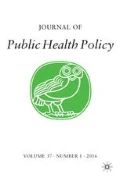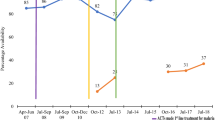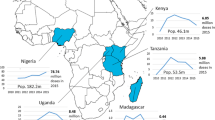Abstract
In 2004, Ghana adopted Artemisinin-based Combination Therapy (ACT) for the treatment of uncomplicated malaria. The use of ACTs had been low, especially in the private sector, because of higher prices of ACTs. The Affordable Medicine Facility for Malaria Initiative, in which international organizations subsidize ACTs to make them affordable locally, is being implemented in Ghana. We document the processes, challenges, and achievements of this initiative in Ghana based on a review of policies, guidelines, reports, meeting minutes, and an internet search. The review spanned activities from July 2009 to December 2011. Ghana was the first country to receive these subsidized ACTs (called ‘co-paid’), and availability of ACTs increased from 31 per cent to 83 per cent nationwide. The price of ACTs dropped from about US$7 to $0.75 for adults and from $5 to $0.5 for children. Misuse of anti-malarials so that they fail to improve health and can spread resistance may occur if the initiative is not well managed. Collaboration with stakeholders, especially the private sector, and implementation of appropriate supportive activities is important with this initiative.

Similar content being viewed by others

References
National Malaria Control Programme (NMCP). (2009) National Malaria Control Program Strategic Plan 2008–2015. Accra, Ghana: Ghana Health Service.
Ghana Health Service (GHS). (2012) Ghana Health Service 2011 Annual Report. Accra, Ghana: Ministry of Health, http://www.ghanahealthservice.org/publications.php?st=15, accessed 6 February 2013.
Ghana Health Service (GHS). (2009) Anti-Malarial Drug Policy for Ghana. Accra, Ghana; Ghana Health Service, Ministry of Health.
Koram, K.A., Abuaku, B., Duah, N. and Quarshie, N. (2005) Comparative efficacy of anti-malarial drugs including ACTs in the treatment of uncomplicated malaria among children under 5 years in Ghana. Acta Trop 95 (3): 194–203.
Ghana Statistical Service (GSS) and Macro International Inc. (MI). (2008) Ghana Demographic and Health Survey 2008. Calverton, MD: GSS and MI.
Arhinful, D.K., Kusi, A., Eghan, K., Owunna, C. and Embrey, M. (2009) Assessment of Malaria Pharmaceutical Management Systems in Ghana. Submitted to the US Agency for International Development by Strengthening Pharmaceutical Systems (SPS) Program. Arlington, VA: Management Sciences for Health, http://www.msh.org/projects/sps/sps/Documents/ up;oad/Ghana_pm_malaria_assesment_full.pdf, accessed 6 February 2013.
Arrow, K. (2004) Saving Lives, Buying Time: Economics of Malaria Drugs in an Age of Resistance. Washington DC: National Academies Press.
AMFm Task Force-Roll Back Malaria Partnership. (2007) Technical Design for the Affordable Medicines Facility – Malaria, http://rbm.who.int/partnership/tf/globalsubsidy/AMFmTechProposal.pdf, accessed 31 January 2013.
Global Fund (GF). (2011a) Affordable medicine facility for malaria. About AMFM, http://www.theglobalfund.org/en/amfm/about/, accessed 14 November 2012.
Global Fund (GF). (2011b) Affordable medicine facility for malaria. Origins of AMFM, http://www.theglobalfund.org/en/amfm/about/history/, accessed 14 November 2012.
Ministry of Information. (1992) Pharmacy Council Act of Ghana 489. Accra, Ghana: Fourth Republic, Ministry of Information.
Ministry of Information. (1992) Food and Drugs Act of Ghana 3058. Accra, Ghana: People's National Democratic Council Law, Ministry of Information, 2013.
AMFm Independent Evaluation Team. (2012) Independent Evaluation of Phase 1 of the Affordable Medicines Facility – Malaria (AMFm), Multi-Country Independent Evaluation Report: Final Report. Calverton, MD and London: ICF International and London School of Hygiene and Tropical Medicine.
Global Fund. (2012) Board approves Integration of AMFm into core Global Fund Grant, cited 15 November 2011, http://www.theglobalfund.org/en/mediacenter/newsreleases/2012-11-15_Board_Approves_Integration_of_AMFm_into_Core_Global_Fund_Grant_Processes/, accessed 6 February 2013.
Author information
Authors and Affiliations
Additional information
To guide other countries, the authors explain how Ghana piloted AMFm to increase affordability and availability of high quality artemisinin-based combination therapy (ACT) for uncomplicated malaria – especially through the private sector.
Rights and permissions
About this article
Cite this article
Malm, K., Segbaya, S., Forson, I. et al. Implementation of the Affordable Medicines for Malaria Facility (AMFm) in Ghana: Processes, challenges and achievements. J Public Health Pol 34, 302–314 (2013). https://doi.org/10.1057/jphp.2013.12
Published:
Issue Date:
DOI: https://doi.org/10.1057/jphp.2013.12



